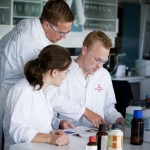 I’ve written before about the growing use of social and collaborative technologies in science. Some new research from the MIT Center for Biomedical Innovation has sought to correlate all of the projects currently taking place in this field.
I’ve written before about the growing use of social and collaborative technologies in science. Some new research from the MIT Center for Biomedical Innovation has sought to correlate all of the projects currently taking place in this field.
The authors believe that the collaborative approach typified by the Harvard Catalyst project is the future of research, and are calling for researchers and academics to begin sharing their collaboration stories so that the process itself can be improved, whilst also training and educating future leaders on the necessary skills.
“Getting new, better, affordable drugs to the right patients faster involves a series of historically independent decisions made by different players or stakeholders,” says lead researchers Gigi Hirsch. The system is uncoordinated, takes too long, and costs too much. In some cases, the drug—such as new antibiotics for life-threatening resistant infections—may never become available.
“One of the interesting paradoxes of biomedical innovation is increasingly going to be that even though we have the scientific knowledge required to provide potentially better treatments for patients—or even to prevent disease in those who are at high risk—we may be unable to help patients benefit from them anytime soon,” she says.
In an attempt to change this situation, we have recently seen multi-stakeholder collaborations across groups from government, industry and patients to help improve things and find specific shared problems that can be overcome.
“Multi-stakeholder collaborations provide the opportunity to create an environment that allows for new kinds of interactions among the players,” Hirsch says.
By far the largest such effort is the EU’s Innovative Medicines Initiative (IMI). The project began in 2008 and has thus far built more than 40 groups, with investment surpassing €2 billion across a range of projects, from specific health issues to broader ones of drug safety or stem cell research. The success has led to a proposal to extend the effort for 10 years and €3.5 billion. Last year, the U.S. President’s Council of Advisors on Science and Technology (PCAST) recommended the U.S. form something similar.
“The prevalence of multi-stakeholder initiatives reflects a continued optimism about the value of this collaboration approach for addressing biomedical innovation bottlenecks,” the authors write in the paper. “Although the need for collaboration is no longer in question, it is worth noting the importance of this development. A willingness to share proprietary data among industry competitors represents a dramatic shift in the culture of the historically highly competitive pharmaceutical industry.”
As we have seen with collaborative efforts in the commercial world however, many fail to achieve the results expected of them. As such, the researchers propose a very scientific, evidence based approach to understanding what works and what doesn’t work in terms of collaboration. They recommend early steps in this new field and structuring the research to help learn from the past but also to evolve effectively as new innovation challenges emerge..